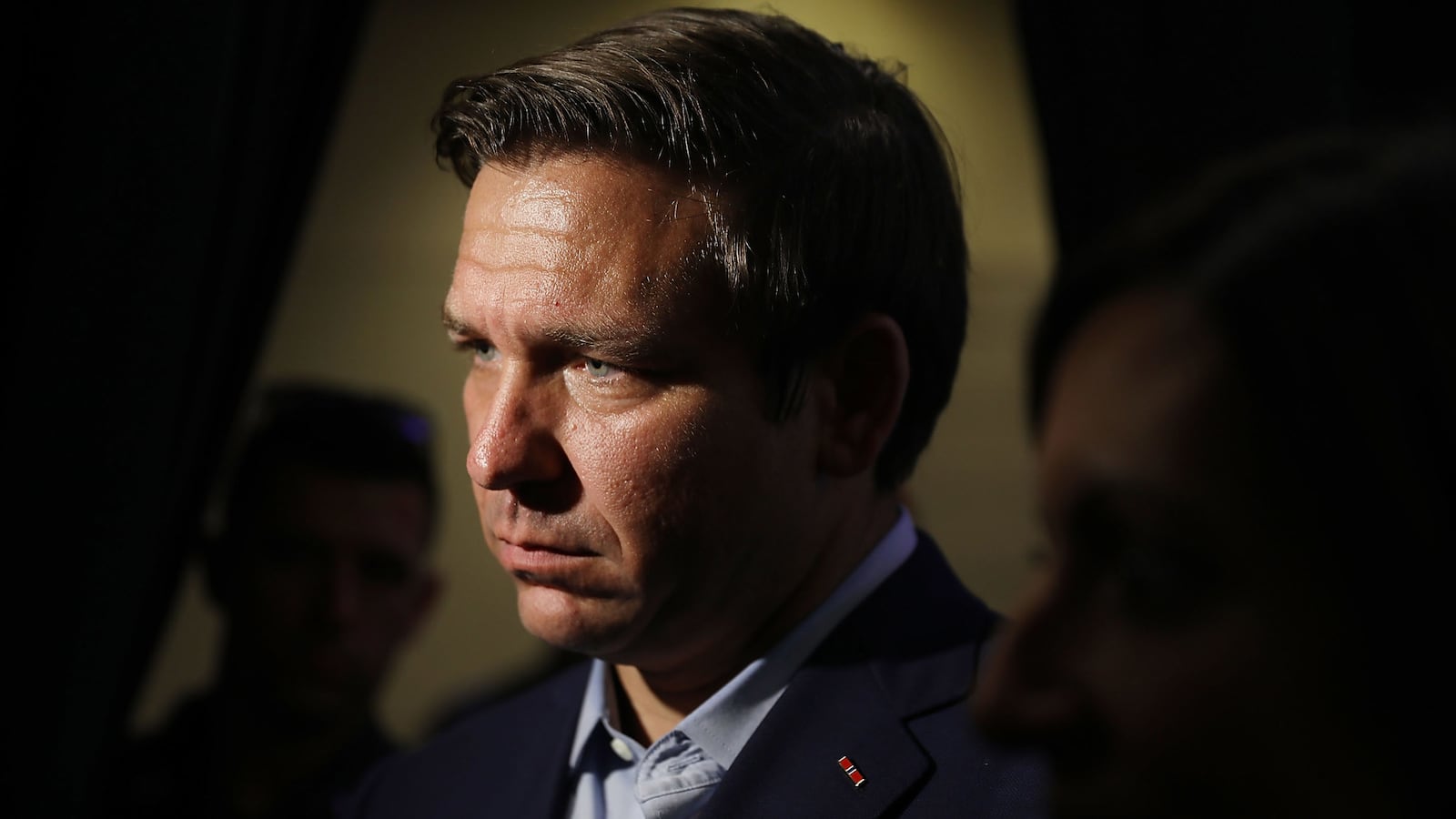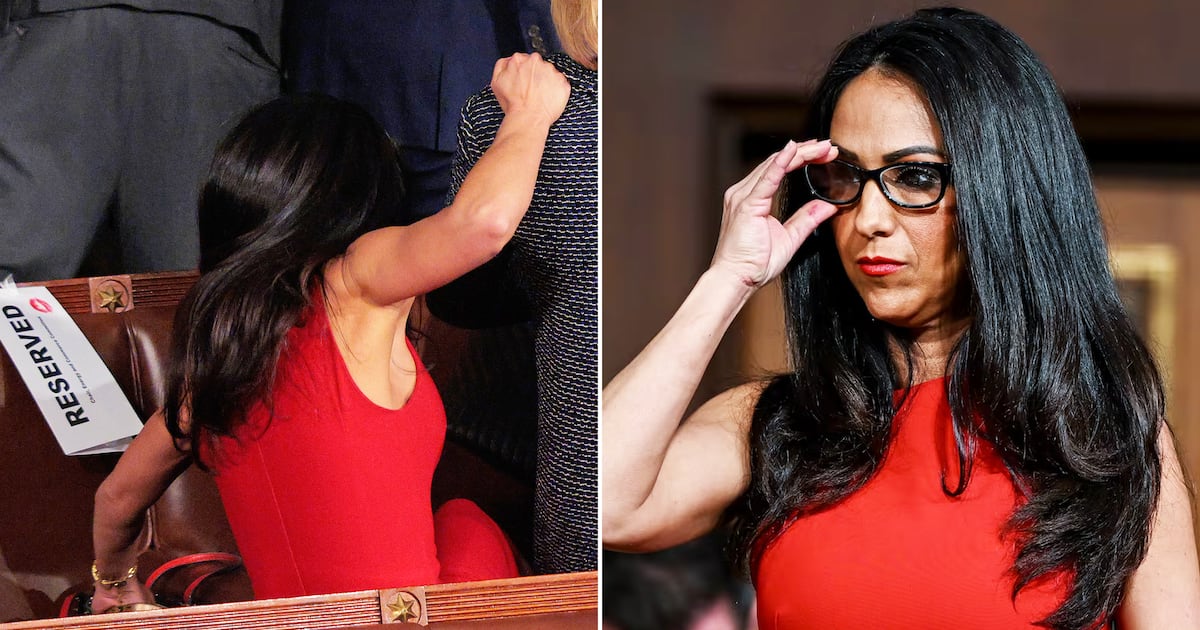After a summer that saw dozens of horrific car attacks on Black Lives Matter demonstrators across America, activists and attorneys are warning that Florida Gov. Ron DeSantis is trying to legalize them, and turn Florida into a model of vigilante anti-protester violence for other states to follow.
DeSantis’ effort follows in the tracks of an earlier one. In 2017, several states proposed—but did not pass—indemnities for drivers who ran down protesters. They did so shortly before the most infamous such episode: the August 2017 murder of antiracist protester Heather Heyer at Charlottesville’s Unite The Right Rally.
Now, should other Republican governors or state legislatures follow DeSantis’ lead, much of the groundwork will already be in place.
DeSantis’ proposals, announced in a Monday tweet, amount to a grab bag of anti-protest measures that read like they were devised by a police union. The measures would ratchet up charges for people involved in disorderly assemblies or damaging statues, make it a crime to participate in a disorderly assembly at a public accommodation or restaurant, and attach racketeering (RICO) liability to people who organize disorderly assemblies.
But perhaps most ominously, they would provide immunity for drivers who strike and even kill protesters “if fleeing for safety from a mob.”
Caroline Mala Corbin, a law professor focusing on constitutional and First Amendment law at the University of Miami, said that while it was difficult to analyze legislation that hasn’t been introduced, it looked like a naked attempt to discourage protest in the state.
“Even if the laws turn out to be constitutional, they are clearly aimed at chilling the exercise of First Amendment rights,” Corbin told The Daily Beast.
Much of the proposed legislation, which combines a number of recent anti-protest tropes like charging protesters under racketeering laws or barring them from posting bail, seems more like a gift to Trump supporters than a response to actual Florida protests. CJ Staples, a lead organizer with the Democratic Socialists of America’s Broward County chapter, said the proposed legislation punched at the left, even though protests in the state had been subdued.
“In Florida, there hasn’t been that much violence or property damage, so to come out with something so aggressive when we have not seen half of the incidents we’ve seen across the country was very concerning and made us wonder where [the legislation] was coming from,” Staples told The Daily Beast. “I’m definitely suspicious as to who authored or provided that bill, because I could definitely see it coming up in other states as well.”
DeSantis’ representatives did not immediately reply to a request for comment. But such a disproportionate response to protests has a recent—and seemingly coordinated—legislative pedigree.
Following widespread demonstrations for Black Lives Matter, against the Dakota Access Pipeline, and by women against Trump, a wave of lawmakers starting in early 2017 introduced bills in at least 18 states raising penalties on protesters. The onslaught prompted a warning from two United Nations human rights experts that American freedom of assembly was under threat.
Lawmakers didn’t succeed. But in North Dakota, Kentucky, North Carolina, Tennessee, Texas, North Carolina, and DeSantis’ own Florida, legislators attempted in 2017 and 2018 to indemnify from civil and in some cases criminal liability drivers who “unintentionally” injure protesters. The bills typically made obstructing a roadway—a common protest tactic—a misdemeanor. Once a protester committed such a violation, then any injury resulting from a driver who took “due care” would have been the fault of the protester.
In Florida, the proposal even explicitly put the burden of proof on a protester to show that they were lawfully protesting.
And it wasn’t only injuries from vehicular assault at protests that the bills would have permitted. In Florida, Kentucky, and North Dakota, the bills expressly indemnified motorists who cause “death to a person who obstructs or interferes with the regular flow of vehicular traffic,” as the Florida bill read. Kentucky’s bill, unlike the others, was introduced after Heyer’s death in Charlottesville.
Andy Stepanian—the vice president of the communications firm Balestra Media and an activist who was in Charlottesville helping counterprotesters with communications during the 2017 Unite The Right march—said the governor’s threat took him back to that moment.
“When I saw that Governor DeSantis announced new legislation eliminating liability for drivers who hit protestors with their cars, my mind immediately went to the intersection of 2nd and Water Street in Charlottesville, where I watched Heather Heyer pass away in front of me and dozens of others were grievously injured,” Stepanian told The Daily Beast.
The 2017-era bills were remarkably similar to each other. Practically identical language appeared in the versions sponsored in states from North Carolina to Rhode Island to Texas to Tennessee. With cosmetic differences, their relevant sections all read: “A person driving an automobile who is exercising due care and injures another person who is participating in a protest or demonstration and is blocking traffic in a public right-of-way is immune from civil liability for such injury, but shall not be immune from civil liability if the actions of the driver leading to the injury were willful or wanton.”
It’s unclear if the similarities were coordinated. Such legislative templates are a feature of the conservative corporate coalition known as the American Legislative Exchange Council (ALEC), which brings together corporate lobbyists and state lawmakers to draft, vote on, and circulate favorable legislation. That legislation infamously included the justifiable-homicide “Stand Your Ground” laws that drew national condemnation after the slaying of Black 17-year old Floridian Trayvon Martin.
But David Armiak, the research director of the left-leaning Center for Media and Democracy that aggressively tracks ALEC and its “bill milling,” said the 2017-era legislation didn’t match ALEC’s patterns. For one, ALEC hasn’t put together a so-called “model policy” on protests to shop to lawmakers, as it typically does with priority legislation. Only four of 18 sponsors of the 2017 legislative push are known to be tied to ALEC, and those lawmakers worked in only three of the seven states.
“Although ALEC shows a lot of love for Florida Governor Ron DeSantis, we have seen nothing to suggest that this disturbing bill is based upon an ALEC model bill,” said Armiak. “However, given the strong ties between ALEC and Florida and other ALEC model bills attacking protest rights, it would not surprise me if some version of this bill appears at ALEC’s State and Nation Policy Summit in December."
ALEC spokesman Dan Reynolds said the group “is definitely and specifically not involved.”
Vehicular attacks have been a shocking feature of violence against demonstrators in the summer of 2020. (They’re also literally a tactic urged earlier in the decade by al Qaeda in the Arabian Peninsula.) USA Today documented at least 66 of them targeting Black Lives Matter protests between May 27 and July 9 alone.
“DeSantis pulling this failed legislation back off the shelf during such a tumultuous moment does not signal leadership—it is the behavior of a societal arsonist,” Stepanian told The Daily Beast.
Staples, the Broward County DSA organizer, said indemnity for car attacks and the potential of racketeering charges were the most worrying to him as an activist.
“We saw it in Charlottesville. That guy’s serving life right now. This year, they’re trying to change the narrative to make it seem like they’re protecting themselves,” he said.
He also expressed concern that the racketeering provision would allow the state to charge protesters for the actions of others, making everyone part of a criminal conspiracy case if a protest was deemed disorderly. He pointed to the revelation that the man linked to one of the first fires of the George Floyd protests in Minneapolis was accused of being a white supremacist posing as an anti-fascist. In such a case under the proposed Florida law, infiltrators could theoretically sabotage a protest, flee, and leave activists on the hook for racketeering charges.
Staples said he’d seen anti-protest bills proposed in other states, but feared that Florida was a grim bellwether.
“I do believe that Florida is the lab rat for how things might turn out, if this does go unnoticed,” he said. “We definitely want to make sure that everybody is paying attention because it won’t stop here. That’s my fear.”








